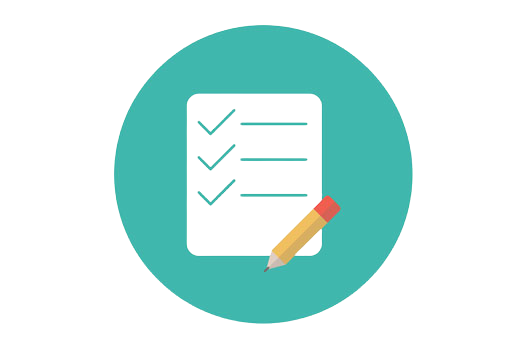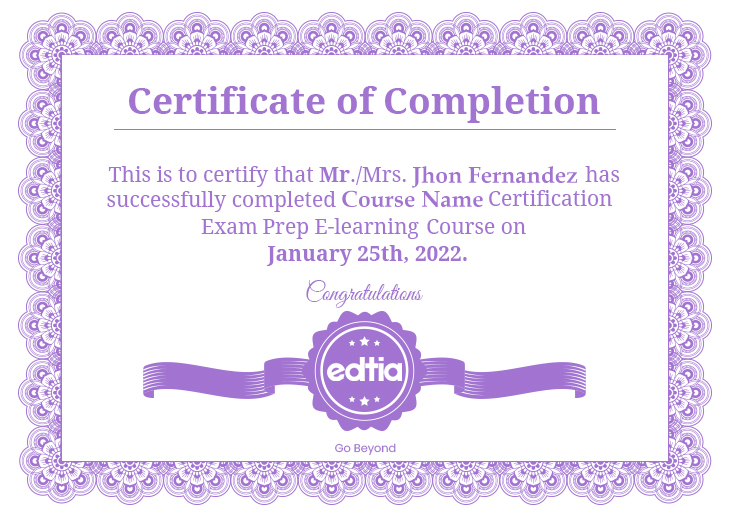Your Shopping Cart

Master Big data skills with EDTIA Big Data Architect Masters Program and lead your way in professional life. In this best Big Data Architect Masters Program, you will learn about the aspects of Big Data Architect.
Big Data Architect Masters Program drives you to be professional in tools and systems utilized by Big Data experts. This master in Big data includes training on Hadoop and Spark stack, Cassandra, Talend, and Apache Kafka messaging system.
Big data architects are responsible for providing the framework that appropriately replicates the Big Data needs of a company utilizing data, hardware, software, cloud services, developers, and other IT infrastructure to align the IT support of an association with its enterprise goals.
Candidates with a bachelor's degree in computer science, computer engineering, or a related field can pursue this Course.
Big Data permits institutions to catch trends and spot patterns that can be utilized for future advantage. It can help to see which customers are likely to buy products or help to optimize marketing campaigns by identifying which advertisement strategies have the highest return on investment.
There are no prerequisites for enrollment in the Big Data Architect Certification. Whether you are a skilled professional working in the IT industry or an aspirant planning to enter the data-driven world of analytics, Masters's Program is designed and developed to accommodate many professionals.
Big Data architects create and sustain data infrastructure to pull and organize data for accepted individuals to access. Data architects/engineers operate with database administrators and analysts to guarantee easy access to the company's big data.
One of the most promising and integral roles in data science is the data architect. From 2018–to 2028, it is expected that the demand for data architects will grow by 9%, higher than average for all other occupations.
learn about Java architecture, advantages of Java, and develop the code with various data types, conditions, and loops.
learn how to code with arrays, parts, and strings using examples and Programs.
comprehend object-oriented programming through Java using Classes, Objects, and different Java ideas like Abstract, Final, etc.
know about packages in Java and scope specifiers of Java. You will also learn exception handling and how multithreading works in Java.
Discover to write code with Wrapper Classes, Inner Classes, and Applet Programs. How to use io, lang, and util packages of Java and Collections.
comprehend what Big Data is, the constraints of the traditional solutions for Big Data problems, how Hadoop decodes those Big Data problems, Hadoop Ecosystem, Hadoop Architecture, HDFS, Anatomy of File Read and Write & how MapReduce works
learn Hadoop Cluster Architecture, essential configuration files of Hadoop Cluster, Data Loading Techniques using Sqoop & Flume, and set up Single Node and Multi-Node Hadoop Cluster.
understand the Hadoop MapReduce framework fully, the working of MapReduce on data stored in HDFS, and advanced MapReduce concepts like Input Splits, Combiner & Partitioner.
discover Advanced MapReduce concepts such as Counters, Distributed Cache, MRunit, Reduce Join, Custom Input Format, Sequence Input Format, and XML parsing.
learn Apache Pig, types of use cases where we can use Pig, tight coupling between Pig and MapReduce, Pig Latin scripting, Pig running modes, Pig UDF, Pig Streaming & Testing Pig Scripts.
learning Hive concepts, Hive Data types, loading and querying data in Hive, running hive scripts, and Hive UDF.
comprehend advanced Apache Hive concepts such as UDF, Dynamic Partitioning, Hive indexes and views, and optimizations in Hive, Apache HBase, HBase Architecture, HBase running modes, and its components.
Learn advanced Apache HBase concepts. Witness demos on HBase Bulk Loading & HBase Filters. You will also learn what Zookeeper is all about, how it helps monitor a cluster & why HBase uses Zookeeper.
learning Apache Spark, SparkContext & Spark Ecosystem, and working in Resilient Distributed Datasets (RDD) in Apache Spark.
comprehend how numerous Hadoop ecosystem components work together to solve Big Data problems, Flume & Sqoop demo, Apache Oozie Workflow Scheduler for Hadoop Jobs, and Hadoop Talend integration.
A. Discover the frequency of books published each year. (Hint: Sample dataset will be provided) B. Find out in which year the highest number of books were published C. Find out how many books were published based on ranking in 2002.
The Book-Crossing dataset consists of 3 tables that will be given to you.
A. Find a list of Airports operating in Country India B. Find the list of Airlines holding zero stops C. List of Airlines operating with codeshare D. Which Country (or) territory has the highest Airports E. Find the list of Active Airlines in the united state
In this service case, there are 3 data sets. Final_airlines, routes.dat, airports_mod.dat
Know Big Data and how it creates problems for traditional Database Management Systems like RDBMS; Cassandra solves these problems and understands Cassandra's features.
Know about Database Model and similarities between RDBMS and Cassandra Data Model. You will also understand the critical Database Elements of Cassandra and learn about the concept of Primary Key.
Gain knowledge of architecting and creating Cassandra Database Systems, complex inner workings of Cassandra such as Gossip Protocol, Read Repairs, and so on.
learn about Keyspace and its attributes in Cassandra, Keyspace, learn how to create a table, and perform operations like Inserting, Updating, and Deleting data from a table while using CQLSH.
Learn how to add nodes in Cassandra and configure Nodes using the "Cassandra. yaml" file. Use nodetool to remove the node and restore the node into the service. In addition, by using the node tool repair command, learn the importance of repair and how to repair operation functions.
Learn critical aspects of monitoring Cassandra: resources used by each node, response latencies to requests, requests to offline nodes, and the compaction process.
learn about the importance of Backup and Restore functions in Cassandra and Create Snapshots in Cassandra, Hardware selection, and Performance Tuning (Configuring Log Files) in Cassandra, Cassandra integration with various other frameworks.
learn about the Design, Implementation, and ongoing support of Cassandra Operational Data.
Learn ETL Technologies and why Talend is referred to as the next Generation Leader in Big Data Integration, various products offered by Talend corporation, and their relevance to Data Integration and Big Data.
learn to work with various types of Data Sources, Target Systems supported by Talend, Metadata, and how to read/write from popular CSV/Delimited and fixed-width files. Connect to a Database, read/write/update data, read complex source systems like Excel and XML, and some essential components like a blog and tMap using TOS.
understand Data Mapping and Transformations using TOS, filter and join various Data Sources using lookups and search and sort through them.
understand the Transformation and various steps involved in looping jobs of Talend, ways to search files in a directory, and how to process them in a sequence, FTP connections, export, and import Jobs, run the jobs remotely, and parameterize them from the control line.
discover Big Data and Hadoop concepts, such as HDFS (Hadoop Distributed File System) Architecture, MapReduce, leveraging Big Data through Talend and Talend & Big Data Integration.
learn Hive concepts and the setup of the Hive environment in Talend, Hive Big Data connectors in TOS, and implement Use Cases using Hive in Talend.
Discover the PIG concepts, the setup of Pig Environment in Talend and Pig Big Data connectors in TOS for Big Data, and implement Use Cases using Pig in Talend. Also, you will be given an insight into Apache Kafka, its architecture, and its integration with Talend through a real-life use case.
develop a Project using Talend DI and Talend BD with MySQL, Hadoop, HDFS, Hive, Pig, and Kafka.
understand where Kafka fits in the Big Data space and Kafka Architecture, Kafka Cluster, its Components, and how to Configure a Cluster
work with different Kafka Producer APIs.
discover to construct Kafka Consumer, process messages from Kafka with Consumer, run Kafka Consumer, and subscribe to Topics.
Discover more about tuning Kafka to meet your high-performance needs.
Learn about Kafka Multi-Cluster Architectures, Kafka Brokers, Topic, Partitions, Consumer Group, Mirroring, and ZooKeeper Coordination.
Understand Kafka Connect API and Kafka Monitoring. Kafka Connect is a scalable tool for reliably streaming data between Apache Kafka and other systems.
Kafka Streams is a custom library for constructing mission-critical real-time applications and microservices, where the input and output data are stored in Kafka Clusters.
know about Apache Hadoop, Hadoop Architecture, Apache Storm, Storm Configuration, and Spark Ecosystem. In addition, you will configure Spark Cluster and Integrate Kafka with Hadoop, Storm, and Spark.
Know how to integrate Kafka with Flume, Cassandra, and Talend.
work on a project, which will be collecting notes from numerous sources.
This Project enables you to gain Hands-On experience on the concepts you have learned as part of this Course. You can email the solution to our Support team within two weeks from the Course Completion Date. Edureka will evaluate the solution and award a Certificate with Performance-based Grading.
Edtia Support Team is for a lifetime and will be open 24/7 to assist with your queries during and after completing the Big Data Architect Masters Program.
The average salary for a Data Architect is $143,573.
To better understand the Big Data Architect Masters Program, one must learn as per the curriculum.


Every certification training session is followed by a quiz to assess your course learning.

The Mock Tests Are Arranged To Help You Prepare For The Certification Examination.

A lifetime access to LMS is provided where presentations, quizzes, installation guides & class recordings are available.

A 24x7 online support team is available to resolve all your technical queries, through a ticket-based tracking system.

For our learners, we have a community forum that further facilitates learning through peer interaction and knowledge sharing.

Successfully complete your final course project and Edtia will provide you with a completion certification.
Big Data Architect Masters Program demonstrates that the holder has the proficiency and aptitudes needed to work with Big Data.
By enrolling in the Big Data Architect Masters Program and completing the module, you can get the Edtia Cybersecurity Certification Course.
Big Data Masters Program helps you master Big data, Hadoop, Spark, etc. This certification training course ensures that you transform into an expert in Data Architect.
Yes, we will provide you with a certificate of completion for every course part of the learning pathway once you have successfully submitted the final assessment and our subject matter experts have verified it.
